By Michael Olympios
Before Cyprus’ citizenship scandal became an international embarrassment, there was evidence hidden in plain sight the government was involved in selling passports to the highest bidder.
Jho Low was a high-profile fugitive financier from Malaya who purchased the Cyprus citizenship at twice the asking price.
The saga came to surface in November 2019 and quickly gained publicity as it became evident the head of the Church of Cyprus received a €300,000 donation in exchange for assisting Low’s citizenship application.
Both the Archbishop and then Interior Minister Socrates Hasikos admitted they had been in contact to discuss Low’s application.
Apparently, the government turned a blind eye to Low’s criminal activities and agreed to grant him Cyprus citizenship.
For what it’s worth, the Interior Minister disclosed that Bank of Cyprus, handling Low’s account, filed a complaint with the Unit for combating money laundering immediately after Low’s citizenship application was approved.
The government is known to have good relations with the Archbishop in exchange for his political support.
Interestingly, although the programme required foreigners eligible for citizenship to invest a total of €2.5 mln in assets and housing, Low allegedly spent €5 mln on a single property.
However, the initial investigation commission headed by the reputable financial watchdog Demetra Kalogerou discovered the real value of his property was only €800,000.
So, the obvious question is who benefited from the difference of more than €4 mln?
Al Jazeera aired a sensational documentary last October capturing on camera a Cypriot lawyer saying the more difficult the application, the higher the required value of the investment.
Economic theory will support such a claim.
Evidently, this was the practice in the case of Jho Low.
President Nicos Anastasiades played a major role in promoting the programme, publicly assuring it was free of any pitfalls.
His critics accuse him of having a massive conflict of interest through the law firm that he established and is presently run by his daughters since he left the firm to take office back in 2013.
Anastasiades repeatedly played down these accusations, arguing he is no longer involved in the affairs of his former law firm.
Not a very convincing argument, though.
His son-in-law is involved in real estate development, mostly geared toward investors of the passport scheme.
He became a political liability for the president when he aired a short promotional video showing him driving a luxury vehicle in Limassol, living the life of the rich and famous to attract foreign investors.
The promotional video echoed the spirit of the government website – Cyprus Citizenship by Investment – which promoted the view, “In today’s world of chaos, people are looking for a spot without chaos where they can enjoy life, rebuild a life or start a new life.”
That’s what many people like Jho Low tried to do with ill-gotten gains in Cyprus and their Cypriot passport.
Vertically integrated
In a way, President Anastasiades, through his family business activities, became vertically integrated.
His son-in-law was selling luxury properties, his daughters prepared the citizenship applications and the cabinet headed by Anastasiades approved these applications.
The current investigation commission is due to publish an interim report by the end of the month.
It remains unclear whether it will contain any details of possible conflicts of interest or wrongdoing of the president, although he has testified.
But any such evidence will not come from questioning, but from examining the applications that were processed through the president’s family’s law firm.
The president remains adamant that no such evidence exists, declaring no wrongdoing on his part or his family.
Others criticised the president for blowing up the UN-sponsored chance in 2017 to solve the Cyprus problem in Switzerland.
They argue that Anastasiades backed down from his long-declared position of a bi-zonal bi-communal federation which he supported in the referendum in 2004 and based his 2013 election campaign on.
Critics maintain that Anastasiades did not wish to upset the lucrative citizenship programme that benefited his family. But his critics have yet to provide hard evidence for such allegations. So far, President Anastasiades denies any wrongdoing.
However, the Al Jazeera report tells a different story.
Speaker of the House, Demetris Syllouris, appeared in the broadcast promising an undercover Al Jazeera reporter, that he could summon the Interior Minister to his office to find a solution to any problem presented in the application of his client.
Syllouris resigned within days after the report aired.
But the admission he could work with the government to find a solution for an application of a foreigner with a criminal record raises questions about the programme which gained traction after Anastasiades first took office.
And the case of Jho Low points to political malpractice by President Anastasiades.
Michael Olympios is an economist, business consultant, special contributor to the Financial Mirror










